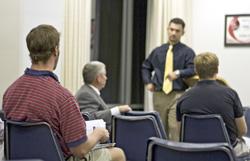
Danny Boemermann
Student Government held its first town hall meeting Tuesday night, with Campus Police present and detailing new information about Monday’s Ku Klux Klan chalking.
“The Free Expression Tunnel does have cameras,” Campus Police Chief Tom Younce said.
Younce showed the audience photos taken at the scene of the three people who left the chalk messages detailing a possible KKK meeting. Campus Police is working toward enhancing photos to use to determine who was involved, according to Younce.
Neil Ballentine, a junior in biological science, presided over the meeting and said it was meant to present campus issues to students.
Thirty people, mostly members of Student Government, attended the meeting.
Members of the Athletics Department and Campus Police were on hand to answer questions regarding ticketing and campus safety.
“The entire point is to raise student awareness of the issues,” Ballentine said. “We want students to know the issues they are concerned with are being thought about and being resolved.”
Ballentine said the meetings will be held once a month and were open to all students.
“These meetings really are for the students, by the students,” Ballentine said.
Associate Athletics Director for External Operations Dick Christy emphasized the importance of involvement to the Athletics Department.
“We understand how your contribution can impact N.C. State Athletics whether you are an athlete or in the stands,” Christy said.
According to Christy, there were a few new programs in the works for students.
The priority point system will allow students who attend multiple games to earn benefits such as better tickets, said Christy, similar to the system practiced by Student Wolfpack Club.
“If you wear a N.C. State hat and are a little Wolfpacker, you deserve a chance to earn better tickets,” Christy said.
The second issue they are pushing toward is improving the stand-by line, he said. With an increasing amount of no-shows, the stand-by line gives students with tighter schedules the opportunity to get into games, Christy said.
The real push for these improved programs according to Christy is to increase student attendance to games, said Christy.
Christy also said the athletics department is also working toward improving seating at basketball and other high-demand games.
Christy addressed one student’s complaint about chaotic student lines by stating that the department is trying to resolve the issue, however the cost of bar-coding is limiting.
The time it takes to conduct a level-two pat down on every student, Christy said, is a process that has been necessary since Sept. 11, 2001, but it adds significant time to a student’s wait in line.
The Athletics Department is ultimately working toward an online ticket distribution system to improve the atmosphere at all sporting events, and to bring competition, Christy said.
The estimate for the 2009-2010 revenue need is $43 million, Christy said. These costs range from the $10,000 necessary to clean up after football games to security costs, he said.
Younce emphasized the importance of utilizing the tools available through Campus Police.
“We are one of the only departments on campus that students have access to 24/7, 365 days a year,” Younce said.
When someone calls 9-1-1 on campus the phone call is automatically rerouted to N.C. State and is tracked using GPS programming. Campus Police can track someone within five feet of their location and are working towards vertical tracking, Younce said.
Students can also call (919) 515-3000 to reach campus police directly, he said.
The most important issue students should be concerned with, according to Younce, is crime prevention.
“Most of the crimes that happen on campus are crimes of opportunity,” Younce said. “No one comes to campus thinking they will break the law, but it is easy to find a window of opportunity.”